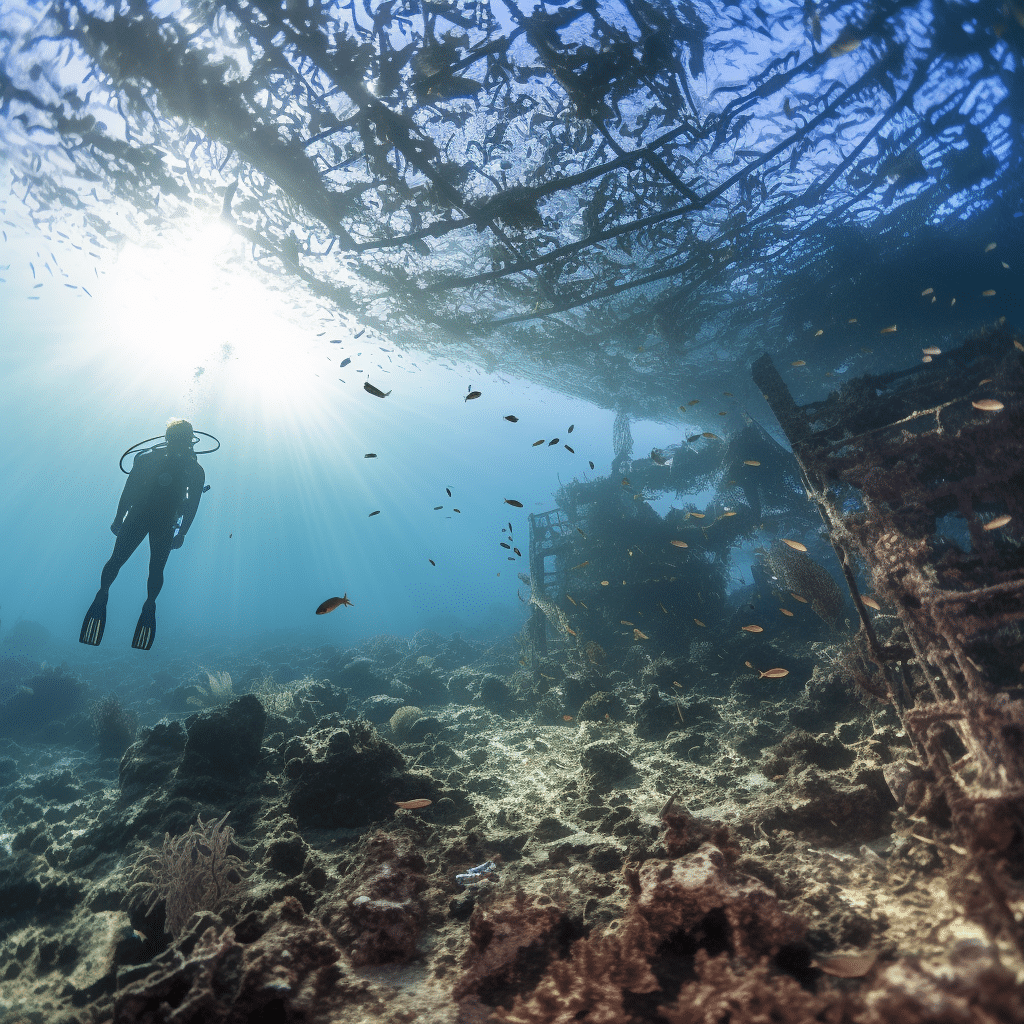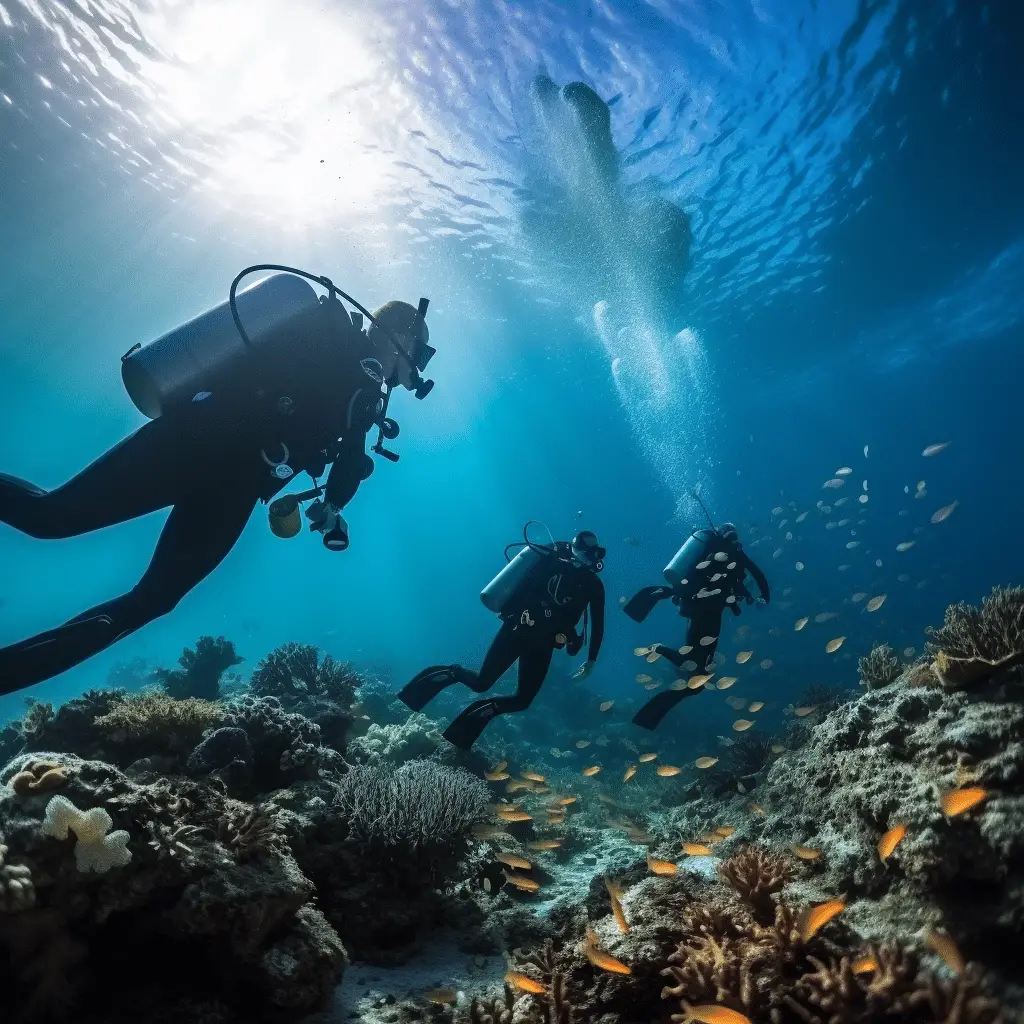Sustainable dive tourism is making great leaps forward! Dive sites are being protected and restored, while local communities are profiting from new economic opportunities. Innovative tech like underwater drones and coral restoration projects are transforming the industry.
Sustainable dive tourism is gaining tons of attention because of its focus on environmental conservation. Divers now have access to modern gear that lets them explore the underwater world without causing damage. High-tech underwater drones with top-notch cameras help marine biologists observe marine life and monitor coral reefs.
Community involvement and socio-economic development are key parts of sustainable dive tourism. People living near popular dive spots now have a role in preserving their natural resources. They get trained as dive instructors, tour guides, or marine park rangers, so they can join eco-tourism initiatives while earning money.
In Costa Rica’s Cocos Island National Park, divers are helping with an amazing coral restoration project. They collect coral fragments from damaged areas and attach them to artificial structures underwater. These corals grow and create new habitats for marine life, which helps boost coral recovery and biodiversity in the region.
The progress of sustainable dive tourism brings optimism that humans and marine ecosystems can exist together peacefully. As technology keeps improving and more people follow sustainability principles, we get to know the underwater world better, which leads to more innovations for protecting our oceans.
Definition of sustainable dive tourism

Sustainable dive tourism involves reducing negative effects on the environment and local people. To do this, eco-friendly practices such as biodegradable wetsuits and non-toxic sunscreen are used. In addition, underwater clean-up and reef restoration projects are helping to preserve ecosystems and biodiversity.
Organizations such as Green Fins and Blue Flag are certifying sustainable dive operators who prioritize education and awareness programs. They want to create a sense of responsibility in divers towards the underwater world.
Technology has also contributed to sustainable dive tourism. Drones with cameras are being used for research and monitoring, and VR technology is being used for dive training.
Pro Tip: Choose a dive operator certified by Green Fins or Blue Flag. They have strict sustainability guidelines.
Importance of sustainable dive tourism
Sustainable dive tourism is key for safeguarding marine ecosystems and assisting local communities. It keeps the underwater environment in balance, while providing economic possibilities for coastal areas.
- Sustainable dive tourism stops the damaging impacts on marine life, like coral reefs and fish populations. When divers apply responsible diving methods, such as not touching or disturbing sea creatures, they help protect these special ecosystems.
- It aids conservation campaigns by raising money for marine-protected areas and environmental projects. Sustainable dive operators generally donate a part of their earnings towards conservation activities, making sure that future generations can also appreciate the beauty of the underwater world.
- Sustainable dive tourism bolsters local economies through job formation and income generation. It provides job chances for local communities, particularly in coastal regions where alternate sources of income may be limited.
Furthermore, sustainable dive tourism motivates learning and understanding of marine conservation matters. By taking part in sustainable diving activities, divers become ocean ambassadors, sharing details about the significance of preserving our underwater ecosystems.
A noteworthy fact: According to Green Fins, an organization that promotes eco-friendly diving practices, sustainable dive tourism can cut damage to coral reefs by up to 80%.
By adopting sustainable techniques in dive tourism, we can guarantee the longevity of our oceans and make a more promising future for both marine life and coastal communities.
Latest advancements in sustainable dive tourism
The world of sustainable dive tourism is ever-evolving. Let’s delve into the latest developments! Industry leaders are embracing innovative strategies to protect our oceans and marine life.
Notable advancements making waves include:
- Coral Reef Restoration – Conservationists are restoring damaged corals through coral gardening. This revives biodiversity and safeguards habitats for future generations.
- Eco-friendly Dive Gear – Manufacturers are creating wetsuits, biodegradable sunscreen, and diving masks that don’t need harmful chemicals.
- Sustainable Dive Resorts – Resorts are using renewable energy, managing waste responsibly, and supporting local conservation initiatives.
- Citizen Science Initiatives – Divers can contribute data on marine life and coral health, playing an active role in preserving our oceans’ balance.
These advancements create a positive ripple effect. They encourage sustainability among divers, and inspire continual innovation. Protecting our oceans benefits the environment and enhances the dive experience. Sustainable practices are now deeply ingrained in the industry’s ethos. Advancing these initiatives ensure a future where our underwater world thrives!
Benefits of sustainable dive tourism
Sustainable dive tourism has many advantages. It:
- encourages conservation and protection of marine ecosystems.
- creates economic benefits for local communities.
- increases awareness and understanding of marine environments.
- provides chances for education and research.
- encourages eco-friendly practices.
- preserves cultural heritage.
Responsible diving habits are key for sustainable dive tourism. This entails:
- limiting contact with underwater habitats and wildlife.
- preventing damage to coral reefs and other sensitive areas.
- using environmentally friendly sunscreen.
Remember to research and choose operators who prioritize conservation and follow best practices before engaging in sustainable dive tourism.
Case studies of successful sustainable dive tourism projects
| Project Name | Location | Achievements |
|---|---|---|
| Curaçao Coral Restoration Foundation | Curaçao, Caribbean | Rescued 50,000 square feet of coral reef with conservation efforts. |
| Great Barrier Reef Marine Park Authority | Queensland, Australia | Enforced regulations to protect the world’s largest coral reef system. |
| Misool Foundation | Raja Ampat, Indonesia | Set up marine protected areas and community-based initiatives, resulting in increased fish populations. |
Plus, artificial reef installations and responsible tourist guidelines also aid in preserving marine life. And, they help local communities economically and socially.
Misool Foundation saw an amazing 243% increase in biomass in their marine protected areas (source: Misool Foundation website). This proves sustainable dive tourism can make a positive impact.
Through these successes, it’s clear sustainable dive tourism is effective. With ongoing efforts from governments, local communities, and diving operators we can save our underwater ecosystems for the future.
Challenges and future prospects of sustainable dive tourism

Sustainable dive tourism faces difficult challenges. Yet, it offers exciting potential. To guarantee long-term sustainability, the tourism industry must tackle overfishing, destruction of coral reefs, and pollution. Promoting responsible diving, implementing conservation initiatives, and conducting research on marine ecosystems can help protect underwater environments.
To address these issues, dive operators are using eco-friendly practices. They are employing sustainable diving techniques and teaching divers about preserving marine life and ecosystems. Plus, they are utilizing innovative tech like underwater drones and virtual reality to improve the dive experience while reducing environmental impact.
In addition to resource conservation, sustainable dive tourism creates economic opportunities for local communities. It involves them in the planning/management of dive sites, fostering a sense of ownership and promoting sustainable development. It also generates jobs in hospitality, transportation, and marine conservation.
A real story shows the positive impact of sustainable dive tourism. In a small coastal village, a group of local divers established a community-based, responsible diving operation. Working with scientists and experts, they safeguarded their surrounding marine ecosystem. Tourists started pouring in to explore the vibrant underwater world, boosting the village’s economy. This inspiring tale demonstrates that sustainable dive tourism can not only protect resources, but also benefit local communities.
Conclusion
Sustainable dive tourism is advancing rapidly. New eco-friendly dive resorts are emerging, with renewable energy sources, waste management systems, and local conservation initiatives. By choosing such a resort, divers can enjoy a guilt-free experience.
Also, responsible diving practices are being adopted. Divers are now encouraged to maintain proper buoyancy control, avoid contact with fragile corals, and abstain from feeding or touching marine life. Organizations like Project AWARE are spreading awareness about such practices.
Technology is helping too. Underwater drones with cameras allow divers to explore without disturbing marine life. Advanced filtration systems are also removing pollutants from water bodies near popular diving destinations, making it better for both marine organisms and divers.
It is worth noting that coral reefs are home to 25% of all known marine species globally, according to Eco Dive Center in Los Angeles.
Frequently Asked Questions
1. What is sustainable dive tourisms?
Sustainable dive tourisms refers to the practice of engaging in diving activities while minimizing negative impacts on the environment and local communities. It ensures that the activity is conducted responsibly and in a way that supports the long-term conservation of marine ecosystems.
2. What are the latest advancements in sustainable dive tourisms?
Some of the latest advancements in sustainable dive tourism include the adoption of eco-friendly diving equipment and practices, the use of renewable energy sources for dive operations, the implementation of waste management systems, and the promotion of responsible diver behavior through education and awareness campaigns.
3. How do eco-friendly diving equipment contribute to sustainable dive tourisms?
Eco-friendly diving equipment, such as biodegradable sunscreen, reef-safe diving gear, and non-toxic cleaning products, help reduce the negative impact on marine life and coral reefs. By using these environmentally friendly options, divers can minimize their carbon footprint and help preserve fragile underwater ecosystems.
4. How does sustainable dive tourism benefit local communities?
Sustainable dive tourism can bring economic benefits to local communities by creating job opportunities in dive centers, dive resorts, and other related businesses. It also promotes cultural exchange and community involvement, as visitors are encouraged to learn about and respect the local traditions and resources.
5. Is sustainable dive tourisms limited to specific locations?
No, sustainable dive tourisms can be practiced in various locations around the world. While some destinations may have well-established sustainable dive tourism practices, it is a goal that can be pursued anywhere, as long as there is a commitment to environmental conservation and responsible diving practices.
6. How can I contribute to sustainable dive tourisms?
You can contribute to sustainable dive tourism by choosing dive operators and resorts that prioritize environmental protection and community engagement. Additionally, following responsible diving guidelines, participating in marine conservation activities, and spreading awareness about sustainable practices among fellow divers are all ways to make a positive impact on dive tourism sustainability.
